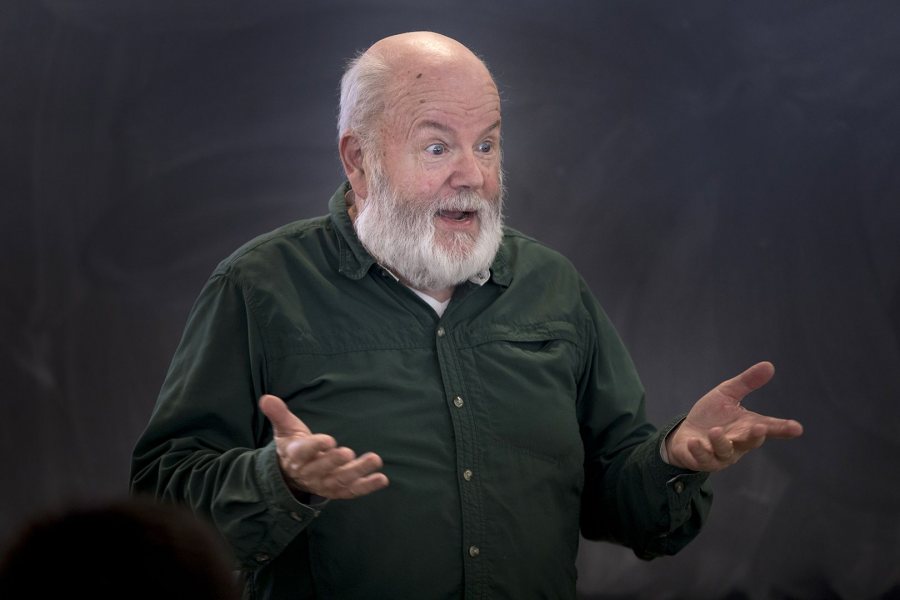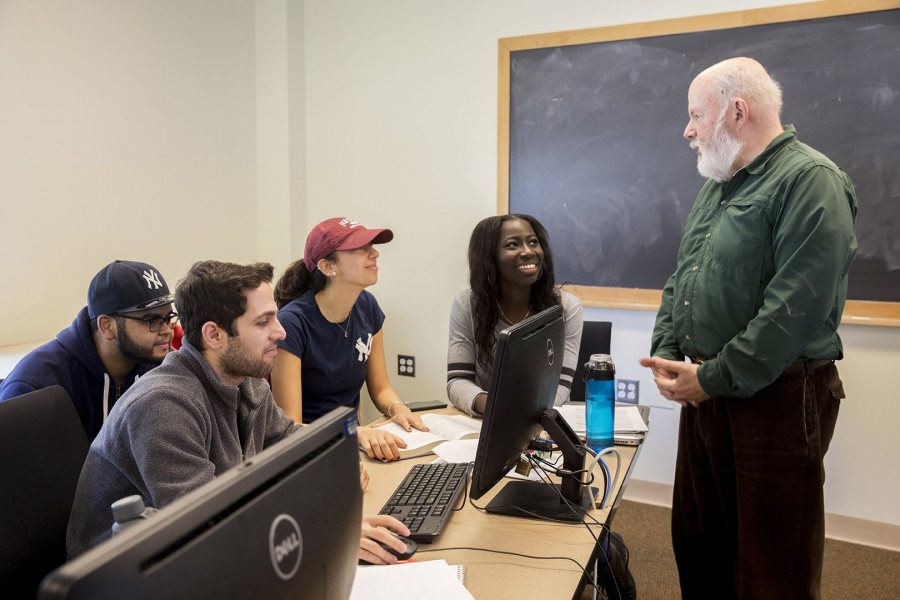
The real-world power of economist Michael Murray’s teaching is on display everywhere his former students go.
Take, for example, Analysis Group in Boston, which has had an active alumni connection since its co-founding by trustee emeritus Bruce Stangle ’70 in 1981.
Jim Hughes, one of Murray’s Bates colleagues, does consulting at Analysis Group. More than once, a former Murray student now working at Analysis has given Hughes “a lecture on the econometric techniques needed for a project that I’m working on. It blows me away.”
“Michael just makes econometrics click for them in a way that other people don’t.”
Making things click for generations of Bates students is why Murray, the Phillips Professor of Economics and a member of the faculty since 1986, has won the 2017 Kroepsch Award for Excellence in Teaching, the college’s top teaching honor carrying a $5,000 prize.
As Hughes’ anecdote indicates, one of Murray’s courses (he’s taught 16 different ones at Bates) is econometrics, a notoriously difficult course at any college because it asks students to use math and statistics to grasp the workings of economic systems.
Students don’t just rave about Murray’s ability to communicate econometrics. They say he even makes it fun. “He made complex concepts enjoyable and interesting to learn,” says Sarah Centanni ’17 of Hingham, Mass.

To his students, Michael Murray is “passionate, intelligent, funny, caring, and personable,” says a former student. (Phyllis Graber Jensen/Bates College)
Murray has written the book on understanding econometrics, literally. His textbook, Econometrics: A Modern Introduction, was published in 2005. “It’s quite different from other textbooks,” he says. “In that sense, I teach the subject in a very different manner.”
It’s a manner that studiously avoids what he calls “black boxes,” which symbolize memorizing. In his book and in his classroom, Murray instead tries to give his students an understanding of econometric theory, rather than simple proficiency in using the various tools of the field, including econometric software.
With that approach, he’s passing on a maxim from his own school days.
An amateur actor who’s been in many Bates theater productions, Murray adopts the character of a beloved high school math teacher who spoke with a nasal twang and would draw out certain words. Time and again, the teacher would tell Murray and his classmates, “Don’t memorize. Understaaaannnd.”
And his students do. “Professor Murray lays out the base of the material in class and he pushes you, the student, to find the answers on your own,” says Dan Willsey ’18 of Glastonbury, Conn. “He holds his students to an incredibly high standard.”
“When I did not understand some material during the course, he talked with me for over an hour until I got it,” recalls Shelby Rader ’17 of Duxbury, Mass.
Here are some scenes of Murray in the classroom as he talks about teaching Bates students:
In courses like econometrics or statistics, an array of software — STATA, Eviews, R, or SPSS — can crunch right through problems that Murray is trying to get his students to understand.
Leaning on those tools, “it’s easy to decide that you want to get your students to learn the mechanics of an analysis,” says Murray. “I figure our students are bright enough to figure out the mechanics. They’ll benefit most from the stuff they couldn’t learn for themselves. And that’s understanding.”
Hughes, the college’s Sowell Professor of Economics and Murray’s colleague since 1992, says the stakes are high when it comes to teaching topics like econometrics or statistics, which he teaches.
It’s a “dangerous thing,” he says, for teachers to succumb to the “temptation to teach econometrics and stats by saying, ‘Let the computer do it.’ Or just teaching students that ‘when faced with this, do that,’ figuring, ‘Who cares? You’re just going to be a research assistant.’”
Students can get by on that kind of teaching, he says, “but Michael’s talent is to get his students to want to go deeper.”
Understanding doesn’t come cheaply, in terms of Murray’s time investment. Students repeatedly mention long office hours, three-hour study sessions before exams, and the time he drove to Bates from Portland after returning on an evening flight in order to hold a 10:30 p.m. study session.
Students and his colleagues also routinely praise Murray’s enthusiasm in the classroom. Actor that he is, he nevertheless disagrees that he’s playing a part — an econ version of Dead Poets Society — as he enthuses about this or that econometric model in a Pettengill Hall classroom.

Economics professor Michael Murray works with students in his econometrics course on April 3 during the final week of classes. (Phyllis Graber Jensen/Bates College)
Murray recalls teaching at the University of Virginia in the 1970s, where he had two sections of an economics course, each with 600 students. There, “the skills I use in theater are very valuable. I can project my voice. I can project my presence. I can move in ways that will hold people’s attention.” In those settings, “there’s a point at which teaching has become performance,” he says.
At Bates, classes are much, much smaller. “I can be myself,” he says. For students, Murray being Murray means experiencing someone who’s “passionate, intelligent, funny, caring, and personable,” says Cosmin Bardan ’16. That authentic love of his work resonates with his students. Murray’s “pure love of the field,” Centanni adds, made her “more invested in my work.”
Still, Murray is an entertaining figure in class, which does serve the purpose, he says, of “infusing energy into the room.”
“Economics — love it though I do — is a subject that can easily put people to sleep and make them tune out,” Hughes says. “Whether you call it performance or you call it agitation, what Michael does is convey his excitement and his belief in the importance of what he is putting across in a way that makes students sit up and say, ‘I really need to know this.’”
“The way Michael’s mind works, he’s thinking, ‘Wow, so you didn’t understand it that way? OK, I just thought of another three ways, and if you still don’t get it, I’ll come up with six more ways to teach it, until I finally see the light bulb come on over your head.”
And the bulb usually blinks bright. “I have never had a professor who cared so much about making sure students understand,” says Alexander Stekler ’17 of Avon, Conn., while Centanni talks about the feeling of “joy and satisfaction when a complex problem finally clicked.” (And yes, we’re still talking about economics.)
In the end, Murray says his classroom style is all about “establishing relationships with the individual students.”
And that, he says, “is what makes it really pleasurable to teach at Bates.”



